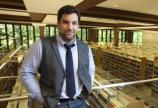At the intersection of religion and the law
- Patty Pitts

At first glance the precise, measured world of law seems the polar opposite of the leap-of-faith, sometimes flamboyant world of religion, but law and humanities faculty member Benjamin Berger sees deep similarities between the two.
"Religions comprise deeply-held beliefs about the world and the rituals, practice and social structures that flow from that world view," says Berger. "Exactly the same can be said about law."
His cross appointment with UVic's religious studies program reconciles both of Berger's academic interests. "I had an earlier interest in law when I was growing up, but it was overshadowed by a growing interest in the humanities," says Berger who earned an undergraduate degree in religious studies at the University of Alberta.
Since then his academic career has been in a continual legal trajectory: earning the graduating law gold medal at UVic, clerking for the Chief Justice of Canada, attending Yale as a Fulbright scholar where he earned a master's and a JSD (the equivalent of a PhD) and being appointed to UVic's law faculty seven years ago.
But his interest in religious studies was never far from his mind or his work. Three years ago he initiated a law and religion course and it's been fully subscribed ever since.
"The students in the course have incredibly diverse relationships to the topic and offer a tremendous breadth of insight," says Berger about his classes. "It's a truly enriching experience to see them exploring new ways of understanding the relationship between law and culture and wrestling with the way that religion inflects how individuals and communities experience the world, including the law."
There's no shortage of "ripped from the headlines" material to fuel discussion in his classes: debates over reasonable accommodation of religious difference; questions about Muslim women covering their faces; the rights of religious children to refuse medical treatment; matters concerning religious instruction and the public school curriculum; issues of the appearance of religious symbols, such as the ten commandments or crucifixes, in public spaces—the "confluence of legal and cultural matters" is in the news every day.
"Irrespective of what anyone might personally believe, one can't sensibly doubt that religion matters, and as long as it matters, the study of it matters," says Berger, who views the interaction of law and religion as an important part of this study. "Religious studies are just unavoidable. The potency of issues around religion and religious understanding is just so palpable now."
Berger doesn't limit sharing his passion for research and teaching to his students. He's also a volunteer member of UVic's Speakers Bureau, sharing his expertise on current issues in criminal law, constitutionalism and law, and religion with members of the community. "The university is an institution that is fundamentally about public service. To advance thinking and add nuance to debate in the community is at the core of the idea of the university," he says. "Curiosity and public interest drive the topics. The challenge is presenting it in an engaging manner when you're only going to see these people once."
Berger's ability to hold a student audience is not in doubt. He's a former recipient of UVic Law's Master Teacher Award and First-Year Class Teaching Award and earlier this year he was named the 2010 recipient of the Canadian Association of Law Teachers Scholarly Paper Award. Not surprisingly, his paper addressed both constitutional and criminal law in the context of broader social forces, examining the role of mercy and conscience in the criminal justice system.
"Is it solely reason that guides our judgments, or are there emotions, passions, sympathies and other kinds of bases for judgment that contribute to what we think is fair and right in a given circumstance?" asked Berger in his award-winning paper.
The award-winning teacher and scholar says he finds his cross-appointment in the Department of Philosophy "so invigorating. The department is bursting with ideas about the deep questions that matter in our lives."
And he'll challenge his students with those deep questions that encompass Berger's own two abiding passions. "When the classroom experience is at its best, it's phenomenal; even when it's deeply challenging—and it's almost always wonderfully challenging—there's nothing I'd rather be doing.

